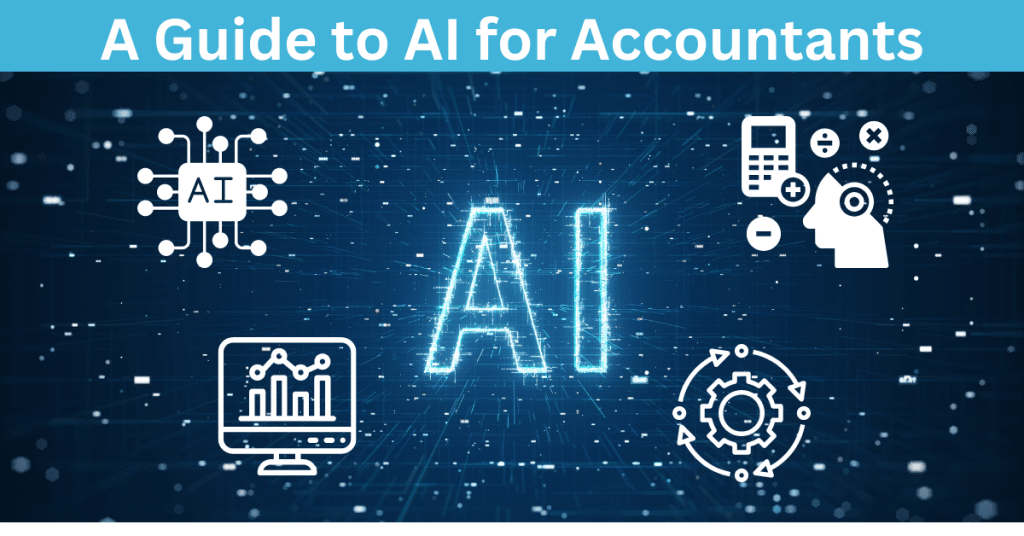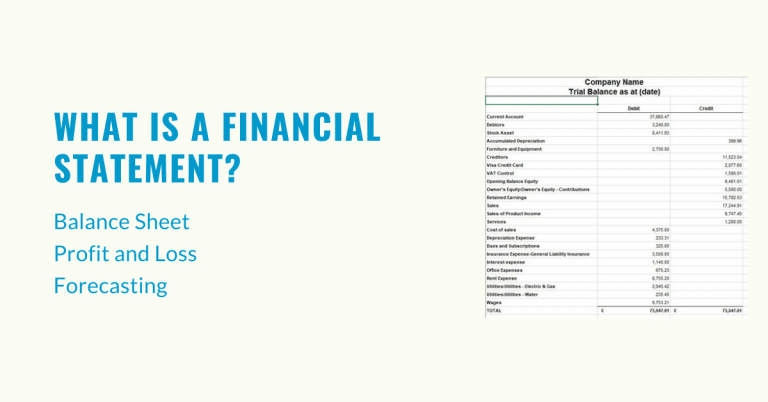A Guide to AI For Accountants, Bookkeepers and Small Businesses
How AI is Revolutionising the Accounting Industry
Artificial Intelligence (AI) has become the buzzword of the tech world and for good reason. It has the potential to revolutionise every industry and change the way we work. The accounting industry is no exception.
In the past, accounting firms have relied on manual processes and spreadsheet-based work. But as technology advances, we see AI being used to streamline and improve accounting processes. In this blog post, we’ll explore how AI is being used to help accountants and the benefits it offers to the industry.

What is Artificial Intelligence?
Before we dive into how AI is helping to revolutionise the accounting industry, let’s quickly talk about what AI is and why it’s so powerful. AI is an area of computer science that enables machine learning to “think” like humans. It does this by using algorithms and data to make decisions like a human would.
Introducing Artificial Intelligence in Accounting Firms
In accounting, AI automates manual tasks and makes processes more efficient. This can range from automating the bookkeeping process to automated tax filing. It’s also being used in predictive analysis, which can be applied to sales or customer data to help predict future trends and opportunities.
AI can also assist with fraud detection, becoming increasingly important as cyber threats become more sophisticated.
Can AI Replace Accountants?
At this stage, AI cannot replace accountants entirely, at least not yet. It can free up time for accountants to focus on more important tasks while the AI handles the mundane ones. For example, a certified accountant may be able to spend less time dealing with bookkeeping and more time helping clients make strategic decisions. This could result in increased efficiency as well as improved customer satisfaction.
Automating Time-Consuming Tasks and Reducing Human Errors
One of the most significant benefits of using AI in accounting is automating time-consuming and repetitive tasks using Robotic Process Automation (RPA). AI-powered software can sift through vast amounts of historical data, minimising the need for manual processing.
With automation, accountants can spend more time analysing data, identifying patterns, and making informed decisions. This reduces the risk of human error and allows for more accurate and efficient work.
Enhancing Fraud Detection
AI can be used to enhance fraud detection by accounting firms. AI-powered software can scan data and identify suspicious patterns, transactions, and anomalies. This enables accountants to identify and prevent fraudulent activity quicker than ever before. AI can also identify patterns that may not be immediately apparent to a human accountant, thus improving fraud detection techniques.
Providing Insights by using Accounting AI
Accountants can use AI to gain valuable insights from data that might otherwise be too vast to analyse manually. AI-powered software can help to identify specific trends and patterns in financial data, providing accountants with a more in-depth understanding of their client’s businesses. This, in turn, can help accountants to provide better advice and support to their clients.
Streamlining Processes
AI-powered software can streamline repetitive, time-consuming tasks, freeing up accountants to spend time on more complex work. For example, AI can automate the accounts payable process, reducing the need for manual data entry and enabling faster payments. This increased automation can streamline the accounting process, making it quicker and more efficient.
Improved Data Accuracy
AI can improve the accuracy of data by minimising the possibility of human error. This is particularly important in accounting, where a single mistake could lead to significant problems.
AI-powered software can speed up the process of data analysis, identifying errors more quickly and accurately than humans. This ensures that the data is more accurate and reliable, reducing the chance of costly mistakes.
Improve Internal Accounting Processes
Artificial Intelligence (AI) is revolutionising how accountants work and making internal accounting processes more efficient. AI-enabled document processing automation can help to streamline and automate tedious tasks such as procurement, purchasing, invoicing, and more.
Here are some specific examples of how AI is being used in auditing today:
- PwC is working with Mindbridge to use AI-embedded tools for their audit process. The company’s AI software can analyse large amounts of data and identify patterns that suggest potential risks. PwC then uses the time to focus on high-risk transactions. They believe this produces better audit quality.
- Ernest and Young are using AI to help auditors identify fraudulent transactions. The company’s AI software can analyse financial data and identify patterns consistent with fraud. Ernest and Young auditors can use this information to investigate potential fraud cases.
AI For Accountants and Accounting Software
AI in accounting software can significantly reduce manual data entry time and allow accountants to focus on more important tasks. Accounting software uses machine learning to recognise and post bank transactions to the correct account. Uploading an expense claim can extract the information and post it to the correct account codes and calculate VAT. It means that accurate expense reports are created.
AI-powered accounting software also provides real-time insights into company performance. This enables accountants to spot potential problems sooner and take corrective action. AI-based accounting software can also generate reports quickly, allowing accountants to make timely decisions based on the most up-to-date data.
Here are some of the ways that Dext uses AI:
Dext is used by many accountants, bookkeepers and small business owners. Here are some of how Dext can help the accounting process.
Optical character recognition (OCR): Dext uses OCR to extract accounting data from receipts, invoices, and other documents. This data can then be automatically imported into accounting software, saving accountants time and financial processes.
Transaction matching: Dext uses AI to match transactions from different sources, such as receipts, invoices, and bank statements. This helps to ensure that all transactions are recorded accurately in accounting software.
Fraud detection: Dext uses AI to identify patterns that may indicate fraud. This helps accountants to investigate potential fraud cases early on.
Other useful Artificial intelligence Software
So far, we have looked at how AI works with accounting, but there are other ways it can be used for accounting practices for business processes.
Online Chatbots
Online chatbots powered by AI can provide customers with up-to-date answers to their questions. This can help reduce the time spent dealing with customer service queries and free up accountants to focus on more important tasks.
AI Tax Software
AI tax software can automate mundane tasks such as filing taxes and calculating tax liabilities. This can save accountants time and help them to avoid errors. AI tax software can also provide insights into how a company’s taxes are calculated, allowing for better planning and more effective use of resources.
AI Writing Tools
AI-powered writing tools can help accountants to draft and format documents quickly and accurately. AI can also generate reports, making it easier for accountants to stay up-to-date with the latest financial information.
Writing tools like Jasper or Chat-CGT can be used to write letters, blog posts., and reports automatically. The AI takes the data from the accounting software and uses it to generate the documents quickly.
Disadvantages of Using Artificial Intelligence Automation
Although AI has many advantages in accounting, there are also some potential drawbacks. For example, AI requires a large amount of data to be accurate and efficient, which not all businesses can access.
Artificial Intelligence is still a relatively new technology; it may take some time for accountants to become skilled and comfortable using it. AI-powered software can be expensive and require specialist knowledge to set up and maintain.
How do Accountants have to Change
Accountants are changing their skills in several ways, including:
- Developing technical skills in data analytics, automation, and coding. These skills are essential for accountants to use the latest technology to automate tasks and gain insights into data.
- They are building soft skills, such as communication, problem-solving, and critical thinking. These skills are essential for accountants to work effectively with clients and other stakeholders.
- They are expanding their knowledge of business and economics. This knowledge will help accountants better understand the financial implications of business decisions.
Yes, there is a lack of skilled accountants in the market. This is due to several factors, including:
- The increasing demand for accounting services. As businesses become more complex, they need accountants who have the skills to help them manage their finances effectively.
- The retirement of baby boomers. A large number of baby boomers are retiring from the workforce, and many of them are accountants. This is creating a shortage of experienced accountants in the market.
- The need for specialised skills. Many businesses are now looking for accountants with technical skills, such as knowledge of data analytics or international taxation.
The lack of skilled accountants creates opportunities for those willing to develop the skills employers are looking for. Accountants who can develop technical skills, soft skills, and business knowledge will be in high demand.
Artificial Intelligence for Accounting Professionals Conclusion
Accounting AI technology is already playing a significant role and has vast benefits. From automating time-consuming, repetitive tasks to improving data accuracy and fraud detection, AI is helping accountants to work more efficiently and effectively.
We can expect even more innovative solutions to be developed as technology advances. The industry has a bright future, and AI will undoubtedly play a significant role in that future. For accountants, embracing AI is essential for staying ahead of the curve and providing their clients with the best possible service.




